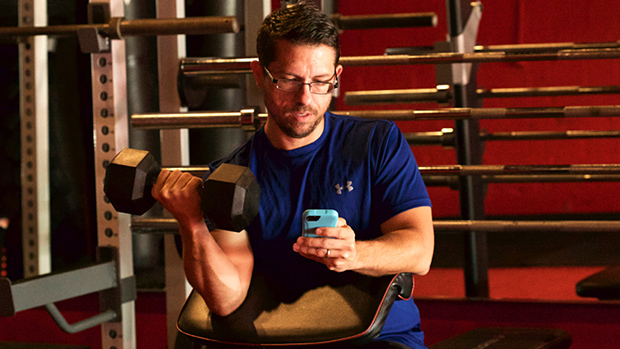Motivated vs. Distracted
Researchers out of Kent State University wanted to know how texting, talking, and listening to music in the gym affects workouts.
Forty-four students were recruited for the study. Each completed four separate 30-minute workouts on a treadmill. In one workout, they were asked to text. In another, they talked on their phones. In a third workout they listened to music on their phones and in a fourth (the control) they just exercised without a phone after having their gadgets pried from their fingers.
The Results
Three things were looked at here: speed, heart rate, and enjoyment. Subjects were not allowed to see the treadmill speed, but they were allowed to alter it.
- Texting: Reduced both treadmill speed and heart rate. Didn't alter enjoyment.
- Talking: Reduced speed, maintained heart rate, and increased enjoyment.
- Listening to music: Increased the average treadmill speed, increased heart rate, and increased enjoyment of the workout.
In short, texting and talking reduced exercise intensity; music gave it a boost. Not big surprises here, but it does beg some questions.
What About Lifting Weights?
While this hasn't been studied much yet, smartphones have been shown to divide attention. This "duel tasking" means that neither task is performed very well. You may recall those studies concluding that texting and driving is similar to drunk driving.
With cardio work, we LIKE this division of attention because cardio can be monotonous and music helps make the time pass. And as the study showed, it helps you to get a better workout, or at least a better cardio or metcon workout.
But some Olympic lifting coaches have said that if a lifter gets too pumped up by his music that he'll start a set too soon, or go for an extra rep he's not ready for. Much like the use of pre-workout stimulants, there's optimally aroused (good) and overly aroused (bad).
On the other hand, powerlifting guru Dave Tate has been known to listen to pop music that he HATES during a workout, then he pours that hate into the bar.
Strength coach Charles Poliquin notes that the research is confusing on this topic: "Some research shows that music increases strength in 50 percent of people, but the same music decreases strength for the other half of the test group. The people who listen to music and get stronger are the people who are inherently motivated by external rewards. Guys who don't like music while they train are inwardly motivated."
Other studies have found that we don't perceive time the same way when we're lost in our gadgets. That's fine if you're in the waiting room of the dentist's office, but not so good if you're between sets at the gym. You think you're on your phone for 30 seconds, but it may be more like a minute or two. You may not notice this, but the three people waiting on the machine or bench certainly do... and they hate you.
Conclusions
- Crank the music during cardio, but turn off the other features on your phone (airplane mode).
- No texting, surfing or Instagramming during lifting. You need to mono-task, not multi-task and divide your attention. If you're tracking, timing, or otherwise using your phone to improve your training, no problem. But turn off all the other tempting apps and functions.
- Experiment with music during different types of training, or don't listen to any music. You might find that you get a better, more focused workout without it. You may even become more aware of the cues your body is giving you about rest, sets/reps, lifting tempo, injuries, and load. Your body is giving you constant feedback – can you hear it? And even if you hate the music your gym plays, maybe that can actually drive your workouts. Maybe.



